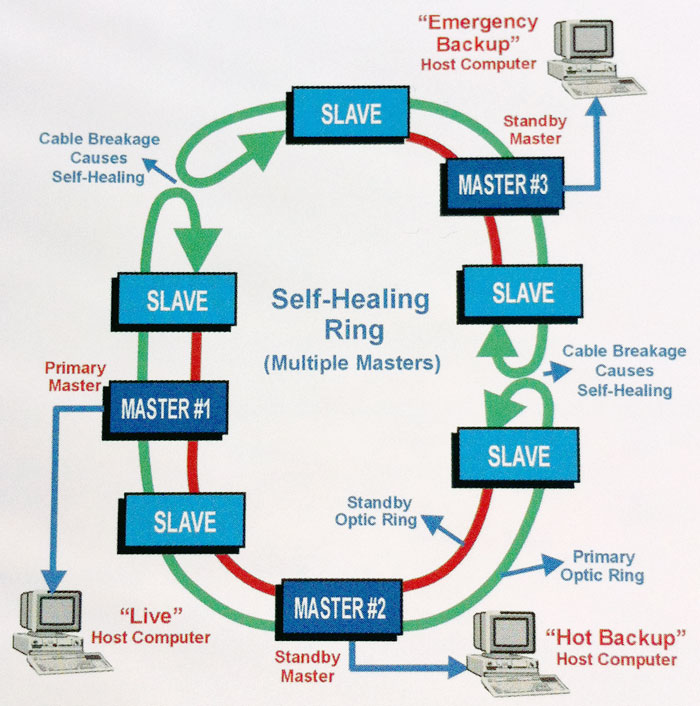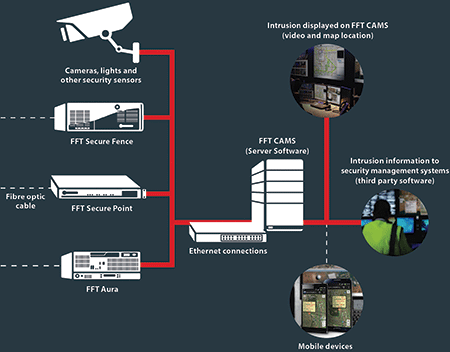How to Decide on a Fiber Optic Security System for Maximum Protection and Speed
How to Decide on a Fiber Optic Security System for Maximum Protection and Speed
Blog Article
The Ultimate Guide to Fiber Optic Protection Systems for Your Organization
In a period where protection worries are extremely important for organizations, recognizing the intricacies of fiber optic innovation can be transformative. This overview details just how incorporating fiber optic safety systems not just improves data defense but additionally uses advantages like resistance to interference and real-time tracking abilities.
Comprehending Fiber Optic Technology

The core of a fiber optic cord consists of a thin glass or plastic center, bordered by a cladding layer that shows light back right into the core. Single-mode fibers are developed for long-distance transmission, while multi-mode fibers are ideal for shorter ranges, commonly utilized within buildings.
Optical fiber are not just quicker however also extra safe and secure than typical electrical wiring. Their integral resistance to electro-magnetic disturbance and the trouble of using the signal without discovery make them a preferred selection for services prioritizing data honesty and safety and security. As companies increasingly depend on secure and effective communication systems, recognizing fiber optic innovation becomes crucial for informed decision-making.
Key Advantages of Fiber Optic Safety
When taking into consideration safety and security alternatives for a business, the benefits of fiber optic systems are especially engaging. Fiber optic innovation supplies phenomenal data transmission rates and bandwidth capacity, making it optimal for taking care of high-resolution video feeds from monitoring cams. This ability makes sure that safety personnel get real-time data, improving general feedback times to prospective protection risks.
Moreover, fiber optic cable televisions are naturally resistant to electro-magnetic disturbance, which can compromise the honesty of typical copper-based systems. This resistance makes sure that the data transferred continues to be safe and secure and uninterrupted, supplying an extra trusted protection infrastructure. Furthermore, optical fiber are less at risk to physical damage, as they are made from glass instead of metal, decreasing maintenance expenses and downtime.
Fiber optic systems provide enhanced cybersecurity attributes, including file encryption capacities that safeguard sensitive data from unapproved accessibility. Jointly, these advantages make fiber optic protection systems a durable choice for businesses looking for to enhance their protection measures.
Setup Refine and Factors To Consider
Thinking about the complexities included, the installation process of fiber optic security systems requires mindful planning and execution. The initial step includes a detailed site analysis to recognize optimum places for cabling and tools. This analysis must think about environmental elements, existing framework, and prospective vulnerabilities.

Additionally, the installment has to follow local building ordinance and market requirements. This may include collaborating with various stakeholders such as structure supervisors, IT teams, and security employees to make certain smooth combination with existing systems.
Post-installation, rigorous screening is necessary to verify system efficiency and determine any type of issues that may arise. By focusing on these considerations during the installment process, companies can ensure a durable and efficient fiber optic safety and security system that fulfills their certain safety and security demands.
Most Current Developments in Fiber Optic Safety
Recent improvements in fiber optic technology have actually considerably boosted the capacities of protection systems for check out this site companies. Among one of the most notable technologies is the integration of fiber optic sensing units that can detect vibrations and invasions along the border of a facility. These sensors provide real-time tracking, enabling fast feedback to potential violations.
Additionally, the development of dispersed fiber optic noticing modern technology enables the continual surveillance of big locations with a single fiber cord. This technique not only lowers installation expenses yet also improves the dependability of keeping an eye on systems by getting rid of the demand for numerous, separate sensors.
Additionally, improvements in multiplexing strategies have enabled companies to send huge quantities of data over fiber optic networks, boosting the capabilities of video surveillance systems. High-definition video feeds can now be sent out over long distances without loss of quality, guaranteeing that safety workers have access to clear and actionable info.
Finally, making use of fabricated intelligence (AI) together with fiber optic systems is transforming threat detection. AI algorithms can assess information from fiber optic networks to determine unusual patterns or habits, permitting aggressive safety and security steps. These developments collectively stand for a substantial leap ahead in fiber optic safety and security technology.
Choosing the Right System for Your Organization
Choosing the proper fiber optic safety system for your company is essential for guaranteeing ideal protection and comfort. To make an educated option, assess your certain protection requirements, thinking about factors such as the dimension of your facilities, the nature of your procedures, and prospective vulnerabilities.
Begin by reviewing the level of protection called for; as an example, high-risk settings may demand innovative systems with incorporated monitoring and breach detection capabilities. Next, think about scalability; as your business expands, your security see it here system must can increasing to suit raised needs without substantial overhauls.
In addition, investigate the reliability and performance of numerous systems. Look for companies with well-known reputations and consumer testimonies that vouch next page for their solution top quality. It's also recommended to make inquiries about the technology's compatibility with existing infrastructure, guaranteeing a seamless assimilation procedure.
Verdict
In conclusion, fiber optic protection systems provide a robust option for boosting service safety and security infrastructures. The most recent developments even more boost the efficiency of these systems, ensuring that services remain safe and secure and versatile in an ever-evolving risk landscape.
Report this page